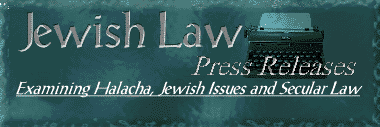

August 21, 2001
Statement Regarding Stem Cell Research
Beth Din of America
Over the last two weeks the Beth Din of America received a number of
querries with regard to stem cell research. Enclosed below is a formal
letter from the Beth Din with regard to this matter.Rabbi Michael J. Broyde
Dayan, Beth Din of America
August 21, 2001
There is an important deliberation taking place in many sectors of American society about the ethics and morality of what is commonly known as stem cell research. This debate will no doubt influence the decision of the American government regarding support of stem cell research. Members of the Jewish community, and of the general American community as well, have asked what the position of Halakha (Jewish law, as expressed by the rabbis in the Talmud) is on this vital issue. This decision is in response to those inquiries.
Halakha does not consider any embryonic development within forty days of conception as having the sacred protected status of a human being. Therefore, the use of embryos for stem cell research is not considered an act of destruction of life. This use of the embryo does not come under any category of abortion after forty days of conception, which is forbidden by Halakha, unless the mother's life is in danger. Consequently, in view of the possible, very positive results of stem cell research for the cure of various diseases, it is not only permitted but it is an imperative to support and proceed with this field of science.
At this time, this decision is limited to the removal of stem cells from embryos resulting from in-vitro fertilization developed for reproductive purposes. The decision is based on the current assumption that such embryos provide sufficient quantities and variety of types to proceed with stem cell research, to the end of scientific knowledge for the relief of serious illness and the saving of lives. Should this category of embryos prove to be insufficient in quantity; or should it consist of too narrow a profile of humanity, and not reflective of the variety of genetic and histological types, thus limiting the potential for healing and for saving lives, then it will be necessary to reconsider the scope of this decision.
Rabbi Gedalia Dov Schwartz
Av Beit Din
